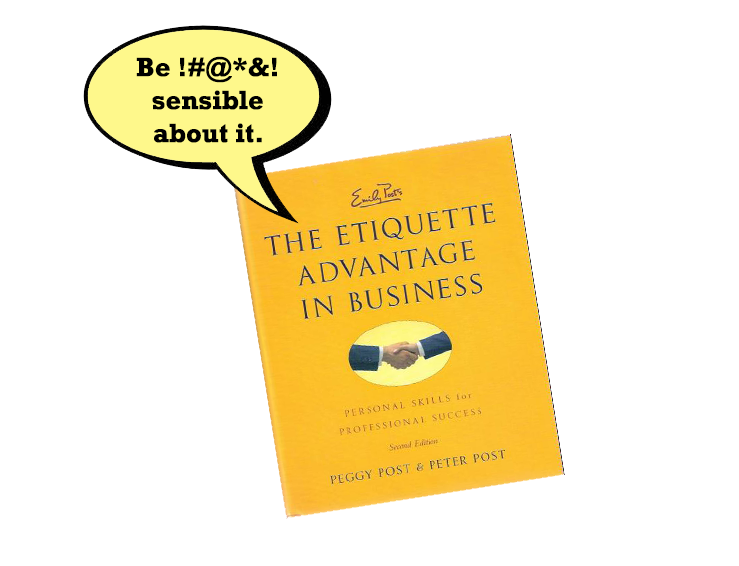Using F-Bombs in The Workplace
A recent meeting prompted me to jot down a few thoughts on the topic of cursing at work.
I not sure at what point it became culturally acceptable to curse at work, especially in marketing or advertising. At some juncture there was an odd reversal from the business climates of the 1950's. Liquid lunches have become politically incorrect (although Fridays are still a grey area), and F-bombs have found their way into the realm of professional jargon. Okay. Go figure. Most of the ad agencies that I have worked with drop F-bombs like loose change.
"Nice flocking ad."
"It's flocking hot today."
"Flooooock! I missed the taco truck?"
A little sculpture I whipped up. A tribute and stand-in.
My very first agency fed from the F-bomb trough with incredible fervor. The 'F' word was embraced as a welcome filler for any word (verb, noun, adverb or adjective) in pretty much every conversation. Occasionally one or two bombs were lobbed into a creative brief. I was green and fresh out of college, clad in a recently purchased suit that would only again surface for weddings. I was not dressed for the unexpected torrential downpour of F-bombs inside the walls of my first agency job, and I had no idea that parties I attended in high school had somehow prepared me for the professional workforce.
One conversation with my boss meant to discuss my promotion from intern to Jr. Art Director essentially went like this:
Boss: "Hey, how's it going? Sit the flock down."
Me: "Fine. Thanks."
Boss: "So those flocking guys in the back - they flocking like you. And they don't flocking like anybody."
Me: "Oh. Okay."
Boss: "So I'm going to make you a Jr. Art Director. Here's what I am going to pay you: _____ ." (The proposed figure was absurdly low and too obscene for this blog post.)
Me: I thought, "Flock! I am going to flocking starve to death," but my reply to my boss' offer was simply, "Okay. Anything else?"
Boss: "Yeah. Never wear that suit again. Thanks. Get the flock out."
I wish I was exaggerating, but there are certain moments in your life you just remember in detail.
http://www.fbomb.co
As an intensifier, the 'F' word can be quite effective. It can pull people out of a post-lunch meeting coma, or it can be craftily delivered to liltingly convey emotions in a down-to-earth manner meant to punctuate an idea. Some, however, just revel in the degree of crudeness that can be achieved — often quite creatively.
The dropping of F-bombs, by the way, is not confined to America, although we do seemingly lead in the frequency of use. I found a guilty pleasure in www.fbomb.co, a brilliant time-waster of a site that plots F-bombs around the world as they are dropped. Apparently there are many more F-bombs being dropped in the U. S. than say, Thailand.
Needless to say, not everyone is comfy with profanity in the workplace. And, some people who are prolific users of four letter words in the office would never drop F-bombs in their own home. Maybe that's the reason. Maybe the words that are stifled at the breakfast table have to come out eventually. Maybe the office is the perfect place to let loose, despite the propensity to offend co-workers. Maybe it's irresponsible to let the bombs build up.
Emily Post's, The Etiquette Advantage In Business, takes this view:
“In company cultures where obscenity and profanity are permitted in the workplace, their use tends to be widespread, and you can’t correct everyone. If foul language makes you uncomfortable, signal your distaste by never using those words yourself, and by excusing yourself from office gatherings whenever the language becomes too raw.
If you sometimes use offensive language yourself, make sure you do so only with people who won’t be made uncomfortable by it. Anytime you’re not sure how your colorful language will affect others, throttle back a bit and save the saltier expressions for another time.”
— Peggy Post and Peter Post
Ahhh... Emily, how we bask in the warmth of your common sense.
It's a great book by the way; it's both thoughtful and classy
I'd venture to say that most of my colleagues that drop F-bombs are smart enough to know when to bring it down a notch. For example, profanity might not be welcomed by a client during a new project pitch. If the client is dropping their own swear words, however, it might be a game-time decision to use similar vocabulary to establish rapport and camaraderie. There are often subtle signals that would indicate whether or not an F-bomb would be a useful tool or merely alienate an audience.
Maybe that's the most important point. Think first. Consider your audience. Then speak.
Words are powerful.




